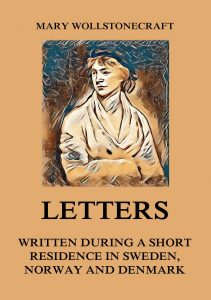Letters written during a short residence in Sweden, Norway and Denmark – Mary Wollstonecraft
Like every word she wrote, Wollstonecraft’s letters are full of personal revelations and wise thoughts. They are doubly interesting because can trace the intimate thought which lay beneath the public statement. One could pick out of this book enough epigrams to make a motto calendar. “Men with common minds seldom break through general rules. Prudence is ever the resort of weakness.” “There is always a mixture of sentiment and imagination in voluptuousness ” might have been written as a partial apology for the wayward Imlay. She relates her interview with the Prime Minister of Denmark, and sums him up as being “more anxious not to do wrong than to do good.”
Format: Paperback
Letters written during a short residence in Sweden, Norway and Denmark.
ISBN: 9783849680879
Available at amazon.com and other venues.
Biography of Mary Wollstonecraft (from Wikipedia):
Mary Wollstonecraft (27 April 1759 – 10 September 1797) was an English writer, philosopher, and advocate of women’s rights. During her brief career, she wrote novels, treatises, a travel narrative, a history of the French Revolution, a conduct book, and a children’s book. Wollstonecraft is best known for A Vindication of the Rights of Woman (1792), in which she argues that women are not naturally inferior to men, but appear to be only because they lack education. She suggests that both men and women should be treated as rational beings and imagines a social order founded on reason.
Until the late 20th century, Wollstonecraft’s life, which encompassed several unconventional personal relationships, received more attention than her writing. After two ill-fated affairs, with Henry Fuseli and Gilbert Imlay (by whom she had a daughter, Fanny Imlay), Wollstonecraft married the philosopher William Godwin, one of the forefathers of the anarchist movement. Wollstonecraft died at the age of 38, eleven days after giving birth to her second daughter, leaving behind several unfinished manuscripts. This daughter, Mary Wollstonecraft Godwin, became an accomplished writer herself, as Mary Shelley, the author of Frankenstein.
After Wollstonecraft’s death, her widower published a Memoir (1798) of her life, revealing her unorthodox lifestyle, which inadvertently destroyed her reputation for almost a century. However, with the emergence of the feminist movement at the turn of the twentieth century, Wollstonecraft’s advocacy of women’s equality and critiques of conventional femininity became increasingly important. Today Wollstonecraft is regarded as one of the founding feminist philosophers, and feminists often cite both her life and work as important influences.
(The text of the last section was taken from a Wikipedia entry and is available under the Creative Commons Attribution-ShareAlike License.)
Publisher’s Note: This book is printed and distributed by Createspace a DBA of On-Demand Publishing LLC and is typically not available anywhere else than in stores owned and operated by Amazon or Createspace.

